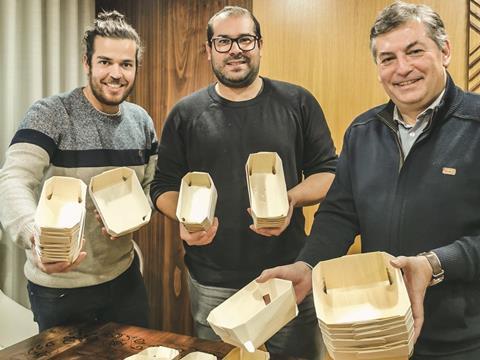
The research initiative PrintCYC says it has used PU-based printing inks to produce colour-stable, odourless, and defect-free recyclates from fully printed PP-based packaging films by mechanical recycling, which can reportedly be incorporated into flat films for thermoforming applications.
PrintCYC is a value chain initiative for the recycling of printed films, with members includinh Brückner Maschinenbau, Constantia Flexibles, Erema, Kiefel, PackSys Global, Profol, and hubergroup. In 2020, the group reported “remarkable results” for phase 1 of the project with the successful production of PP film and packaging samples containing more than 50% of PP recyclate.
However, previous results found that the recyclate quality was not completely satisfying regarding material properties like colour, smell, and processability – a challenge the group appears to have now addressed with its latest development. The group says that this will open up new possibilities for recycling post-industrial printed film waste, as well as the potential for zero-waste production along the value chain of PP-based packaging.
Additionally, the solution can be integrated into processing lines that allow lower energy consumption. A member of the initiative, Kiefel claims it has successfully thermoformed both coloured trays and cups from the recycled PP flat films, on the KMD and KTR series machines.
Olaf Tanner, head of project and product management in the packaging division at Kiefel, explains: “The machine settings practically did not have to be changed for processing of new materials.
“The shape, appearance and functionality of the deep-drawn, recycled packaging is so good that it represents a real alternative to non-food packaging made from virgin material.”
The solution reportedly offers energy savings of up to 20% in heating energy for deep-drawn PP cups compared to virgin material due to the increased proportion of recycled material. According to the group, this effect can be enhanced through the use of dark recyclates, which enable better heat absorption.
Tanner adds: “As a result, we can operate our machines with a shorter heating time.”
According to the research group, the recyclates have also been incorporated up to 100% in the middle later of ABA flat film structures of different thickness (500 µm, 800 µm) without any issues. The use of extrusion technology, equipped with a single screw without degassing or a twin screw with degassing, apparently enables the production of colour films free of defects and odours with excellent thickness, uniformity, and stretchability.













